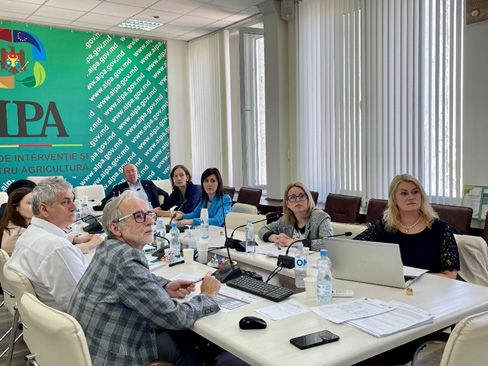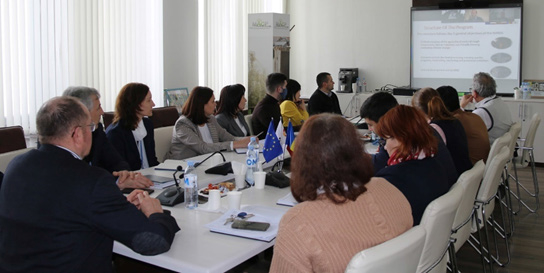EU further supports the Agriculture, Rural Development and Food Safety in the Republic of Moldova

In April and May 2022, the Twinning Project „Further support to Agriculture, Rural Development and Food Safety in the Republic of Moldova” has been assisting MAFI during its final steps towards presenting to the public the National Strategy for Agriculture and Rural Development (NARDS 2023-2027) and the interventions. In this context, a follow up workshop was organised in April where the Twinning experts discussed with the beneficiaries the next steps in the context of ensuring an effective implementation of NARDS 2023-2027.
The “Program and interventions for NARDS 2023-2027 implementation” (incuding a draft financial plan) and an action plan which were handed over to the beneficiaries for further implementation were elaborated. The project achieved substantial results also in the process of establishing a monitoring and evaluation system with measurable indicators. Based on the planned future interventions official EU indicators were selected and incorporated in the indicator plan and the performance-monitoring table.
In order to ensure that the agricultural and rural development information is efficiently collected, of high quality, reliable, and accessible to the relevant stakeholders, the Twinning experts have been elaborating a model which can guide the beneficiaries in the set-up process of a data system. Potential data flows are being identified and practical tools are presented to MAFI staff. Also, a manual of data management within the institution is under development.
LEADER in Moldova is an additional structural tool for implementing the agricultural strategy. The development of local strategies is a cornerstone for accelerating this process. During these months, the beneficiaries were supported in the set-up of the LEADER administration and software requirement specifications. In the context of the latest developments of the future interventions based on the NARDS, Twinning experts prepared technical advice and will continue to ensure support on further LEADER implementation. The realized projects within this framework will ensure concrete steps to support the regional economic development and entrepreneurial sector.
The accreditation audit in AIPA according to Annex I Regulation 907/2014 was continued by the team of Polish experts through reviews of procedures and constant consultations with beneficiaries. The Action Plan with recommendations on how to deal with the institutional weaknesses provides AIPA with a solid roadmap against which the progress can be constantly checked and EU requirements implemented.
The EU Twinning Project is continuing to provide support to ANSA at central and local levels. A training course on the certification procedures for products of animal origin for export to the European Union was successfully organised during 13-14 April 2022. Experts from the State Food and Veterinary Service of the Republic of Lithuania (SFVS) have shared their experience on official certification procedures carried out by the certifying officers. Practical exercises were conducted during the training and officers were trained how to fill out the certificates in the TRACES system.
Furthermore, the Twinning project closed activities regarding the inter-institutional cooperation between MAIA, AIPA and ANSA. Successful missions for strengthening the inter-institutional cooperation were organised. Lithuanian experts from SFVS and the National Paying Agency shared their experience on institutional cooperation in the country and provided recommendations for the improvement of existing inter-institutional agreements between ANSA, AIPA and MAIA for a better strategic planning and reporting on veterinary, food safety and quality, organic and marketing standards. These improvements will ensure a more effective, transparent and goal oriented agricultural subsidy system as well as animal welfare and health, food safety requirements implementation according to the EU best practices. Beneficiary institutions got involved very actively in the discussions on the simplification of direct payments system for animals; inter-institutional data sharing process; control of agricultural subsidies. As a result, beneficiaries concluded that better coordination in the area of granting subsidies and establishing a subsidy control is needed and it can be achieved only through a closer cooperation between the three institutions. For economic reasons, the collaboration and interaction between institutions is important in order to avoid overlapping of duties. Mr. Radu Musteata, Director General, ANSA, noted that a very important point is the implementation of requirements at farm and processing establishment level. Sharing control data and functions of each institution could be a point of future collaboration between MAIA, AIPA and ANSA in order to avoid duplicated or missed controls.

The activities on vegetable oils and trans fats in food were included in the Twinning Project as well. Coronary heart disease is the leading cause of death in the Union and a high intake of trans fats seriously increases the risk of heart disease, more than any other nutrient on a per calorie basis. Establishing a legal limit for industrial trans fats in food appears to be the most effective measure in terms of public health, consumer protection and compatibility with the internal market. Therefore, the Twinning team invited Lithuanian experts of SFVS to share their experience on legislation and official control.
There are established limits of trans fats in food in the EU legislation. A workshop was organised to educate the specialists on the impact on human health, to find common approach for establishing limits in the country, to share experiences on monitoring data in the foodstuffs placed on the market. More than 100 participants joined this workshop online, including specialists from the Ministry of Agriculture and Food Industry, Ministry of Health, ANSA at central and local levels (territorial subdivisions).
It is worth mentioning that Lithuania established a national trans-fat limit in food before the EU approval. It was noted that a transitional period should be foreseen for business to adjust recipes, technologies, labelling for the implementation of limits by FBO and importers.
Currently, discussions on the limits of trans fats in foodstuffs are held in the Republic of Moldova as well. The Republican Centre of Veterinary Diagnostic stated that they are ready to carry out laboratory tests based on the accredited method. In this context, ANSA has plans to perform the monitoring of trans fats in foodstuffs on the local market of Moldova.